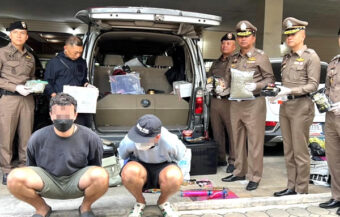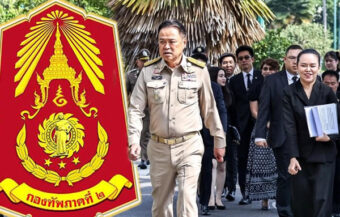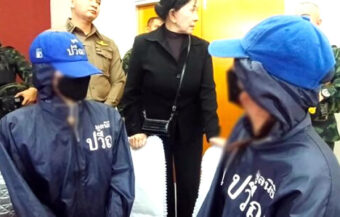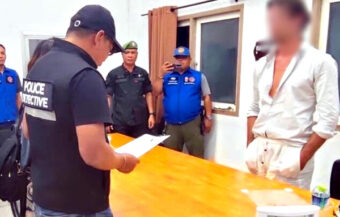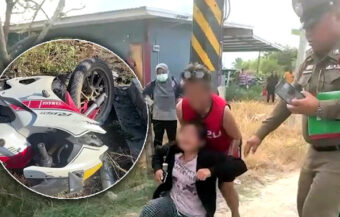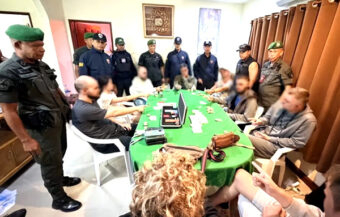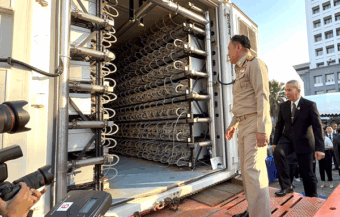In a tense press conference, Prime Minister Paetongtarn Shinawatra revealed her government’s rift over constitutional amendments. She deftly pivoted and spoke of prioritising flood relief instead. Right now, legal scrutiny and cautious anxiety are the order of the day as she navigates mounting challenges in an environment driven by political lawfare using the 2017 Constitution and legal provisions.
A tense and at times testing press conference for Prime Minister Paetongtarn Shinawatra on Tuesday after the weekly cabinet meeting shows that her government is already riven with division. During the interaction with reporters, both the PM and Deputy Prime Minister Anutin Charnvirakul pivoted to the need to focus on fighting the country’s flooding crisis. Nonetheless, it is already clear that the cabinet is split over amending the constitution. Indeed, Prime Minister Paetongtarn suggested that the issue may be sidelined in the interest of government harmony for now. It comes as both she and her ruling Pheu Thai Party find themselves under fire from an onslaught of complaints and legal challenges. In turn, these are being made against them under constitutional and political provisions to several powerful state agencies.
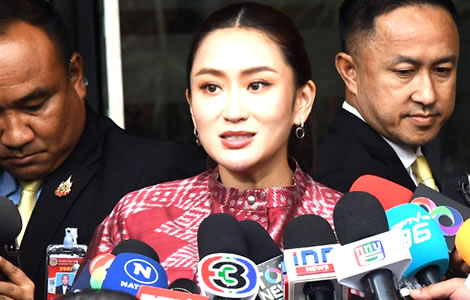
At 1:05 p.m. on September 24, 2024, Prime Minister Paethongtarn Shinawatra addressed the media at Government House. She briefly referred to her asset declaration to the National Anti-Corruption Commission (NACC).
The anxiety and trepidation around the affair highlight the atmosphere created by current constitutional provisions. Especially given the dirty war between the Pheu Thai Party and the Palang Pracharat Party. In short, constitutional oversight abuses are being used to stymie and possibly destroy the ruling party and Thailand’s youngest PM.
Certainly, among these concerns are constitutional ethical requirements framed by the 2017 charter. For instance, it was such provisions that led to the removal of former Prime Minister Srettha Thavisin in August.
Prime Minister expresses caution in submitting her asset declaration due to legal concerns
Meanwhile, on Tuesday, Ms. Paethongtarn revealed that she has not yet submitted her asset declaration. At this time, she is carefully reviewing the details to avoid any legal missteps.
As a political newcomer, she expressed concern about making errors. The PM emphasised her intent to follow all legal recommendations. She noted her inexperience in submitting such declarations.
“I am afraid of making a mistake, so I’m trying to gather as much information as possible to ensure that everything is submitted correctly.” She reassured the public that she was working meticulously to ensure full compliance with the law.
‘I am a man of integrity.’ Dismissed PM defends his honour as he is forced out of Government House
People’s Party on campaign but on guard against potential legal complaints to oversight agencies
When asked if social media scrutiny was influencing her decisions, particularly regarding her substantial jewellery collection, Paethongtarn responded positively. She mentioned that she would review past social media posts to track any jewellery she may have worn over the years.
This step would help her provide a complete asset declaration. The comment and thinking indicate the minefield faced by today’s politicians in Thailand.
Prime Minister responds to inquiries about family business share transfers and constitutional priorities
In response to questions about the transfer of shares in the Pramaisuri Company to her sister and mother, Paethongtarn said she would clarify the matter further.
The 37 year old refrained from giving detailed comments. Nonetheless, she promised to provide transparency regarding the transfer or sale of shares within her family’s business.
Earlier on Tuesday, at 12:15 p.m., the Prime Minister held another press conference following the weekly Cabinet meeting. In brief, Thailand’s youngest and 31st PM addressed the issue of constitutional amendments.
Ms. Paethongtarn acknowledged the need for discussions with coalition parties. However, at this time, she insisted that her government’s current priority was managing the ongoing flooding crisis in northern Thailand.
Nonetheless, it is widely seen that the Bhumjaithai Party has aligned itself with more conservative parties on this issue. The party, as well as the United Thai Nation (Ruam Thai Sang Chart) Party and Palang Pracharat Party, were core elements of the government of General Prayut Chan-o-cha from 2019 to 2023.
Both the United Thai Nation (Ruam Thai Sang Chart) Party and Palang Pracharat Party are parties associated with key military figures in the junta government from 2014 to 2019. This is the government that created the 2017 Constitution.
The charter is both difficult to alter and, significantly, makes it extremely difficult for a strong, dynamic government to emerge in Thailand.
Prime Minister acknowledges constitutional limitations as government faces internal divisions
The reason for this is too many limits and checks and balances. In addition, there is a minefield of ethical and regulatory requirements imposed on political leaders.
Such provisions have already seen three significant political parties dissolved by the Constitutional Court. Nonetheless, just weeks into her premiership, Prime Minister Paethongtarn Shinawatra was in damage limitation mode on Tuesday.
Basically, the Bhumjaithai Party has shifted in its support for an emerging movement of constitutional change.
Significantly, the country’s third-largest party has emerged with unofficial control of the Senate, or upper house. In brief, they can block any constitutional changes proposed.
On Tuesday, Ms. Paethongtarn shared updates from Deputy Prime Minister and Minister of the Interior, Anutin Charnvirakul. He reported worsening flood conditions in Lampang Province.
Paetongtarn emphasises flood relief efforts while sidestepping constitutional amendment discussions
The Prime Minister emphasised the importance of focusing on immediate relief efforts and compensation for affected areas. “This is an important focus,” she said.
Certainly, she was signalling that the constitutional amendment issue would be set aside temporarily. Presently, the priority would be to deal with the more urgent flood situation. Of course, Ms. Paethongtarn was playing for time.
Her government is already showing signs of division. For instance, the reality is that if Ms. Paethongtarn or indeed the Pheu Thai Party is skewered on a constitutional issue. At length either the PM or the party itself could be subsequently removed.
After that, it would leave the Bhumjaithai Party, the United Thai Nation (Ruam Thai Sang Chart) Party, and the Palang Pracharat Party as the parties with potentially viable Prime Minister nominees.
That is, of course, unless a General Election is called. The PM was repeatedly asked about her government coalition partners, specifically the Bhumjaithai Party (BJT) and Ruam Thai Sang Chart Party (RTSC).
She was asked if they were reconsidering their stance on constitutional changes. Paethongtarn’s response was measured and cautious.
Coalition parties signal their opposition to constitutional amendment of ethical standard provisions
Nevertheless, it has emerged that Mr. Anutin and the Bhumjaithai Party are presently set against constitutional amendments to ethical requirements. So too is the Palang Pracharat Party, which finds itself in opposition.
Those supporting amending the constitution warn that the provisions are so broad that relatively minor and indeed frivolous actions by a political officeholder could lead to the country facing a political crisis.
Nonetheless, the conservative or right-wing element of the present government wishes to maintain the status quo.
Certainly, it is thought the United Thai Nation (Ruam Thai Sang Chart) Party may also oppose constitutional change. Indeed, the 2017 Constitution was designed to support such parties from the right of Thai politics.
At length, it is designed to buffer radical change and policies.
On Tuesday, Ms. Paethongtarn simply reiterated that constitutional matters were under Parliament’s jurisdiction. In the meantime, the government was concentrating on delivering for the people, particularly in flood-affected regions.
Anutin, standing alongside the Prime Minister, appeared to dispel any notion of a shift within his Bhumjaithai Party. He firmly stated: “I have not changed my mind, but I am working for the people first.”
Anutin reiterates commitment to ethical framework as coalition partners emerge with a united front
His sharp response appeared at odds with recent statements that his party would oppose constitutional amendments on the ethical requirements.
Nonetheless, this is not unusual for Mr Anutin whose statements are often precisely made. Standing next to the PM, he also rattled off a focus on the plight of Thai citizens engulfed in a flooding crisis.
The Prime Minister further explained that media reports may have caused some confusion about her government’s position on constitutional changes. She clarified that her discussions with coalition leaders remained consistent.
In the meantime, she insisted that what was needed was political stability. Her government wished to address pressing issues such as the floods and economic recovery. In brief, she was retreating from the constitutional amendment issue for now.
“We understand each other,” she said, referring to her conversations with deputy prime ministers and ministers. “What the government should emphasize now is the people’s issues, whether it’s the floods or economic stimulus. If the government is stable and politically stable, the country will be stable as well.”
Prime Minister affirms focus on flood relief over immediate debate on constitutional amendment plan
When asked if a full-scale constitutional amendment would be pursued, Paethongtarn stressed that this would require further discussion. However, she maintained that the primary concern for the government was maintaining stability. In turn, addressing the pressing needs of the public.
Reporters pressed Paethongtarn on whether constitutional amendments had been deprioritized due to the current administration’s focus on flood relief. She affirmed that constitutional changes remain important. However, they were not the most urgent matter at this time.
“Our focus is on the floods and on ensuring that those affected receive compensation as soon as possible,” she said.
She highlighted efforts to accelerate the release of financial assistance to flood victims. The Prime Minister also touched upon leadership changes within the Ministry of Interior.
She mentioned that the outgoing Permanent Secretary had already transitioned responsibilities to his successor, who had begun coordinating relief efforts in northern Thailand.
She expressed confidence that the Ministry was well-prepared to manage the crisis, ensuring that all necessary resources would be deployed to the affected areas. With these words, Paethongtarn concluded her press conference, signalling that flood relief efforts would dominate her government’s agenda in the coming days. She declined to comment further on political matters. After that, she promptly left the podium as reporters attempted to ask more questions.
Deputy Prime Minister reaffirms Bhumjaithai Party’s stance against constitutional amendments
Deputy Prime Minister Anutin Charnvirakul also took the opportunity to reiterate his party’s stance on amending the constitution. Particularly regarding ethical standards. Anutin emphasised, for instance, that the Bhumjaithai Party would not support changes to Section 112, which deals with the monarchy.
In turn, this includes any such provision in a proposed amnesty bill. Certainly, he insisted that the ethical framework must remain clear and honest. Anutin explained, “If we have done nothing wrong, we do not have to fear inspection.”
He added that any amendments must be focused on benefiting the country, not individuals or politicians. His comments reinforced the Bhumjaithai Party’s opposition to changes that could compromise the constitutional framework on ethics.
Anutin cites the Prime Minister’s commitment to transparency while cabinet faces increasing scrutiny
Indeed, Mr. Anutin was able to quote the Prime Minister in his interaction with reporters. At the same time, he gave some insight into discussions before what was a significant press conference for the young Prime Minister.
“I think the government doesn’t know. I’m confident that if I talk to Prime Minister Paethongtarn Shinawatra, she’s not serious about these issues. She said that if you do good, why should you be afraid? If you do the right thing, you’re ready to be investigated. For example, I’ve been working for less than two weeks and I’ve seen a lot of problems. There are a lot of things that the government has to do that will benefit the people. Because anything that is done to benefit yourself or your friends is wrong from the beginning,” Mr. Anutin explained.
Unfortunately, what was seen on Tuesday indicates that while northern rivers may be overflowing and bursting their banks, the cabinet is similarly under threat.
In summary, the country is in crisis both in northern Thailand and at the heart of a very short-lived and already unstable government.
Join the Thai News forum, follow Thai Examiner on Facebook here
Receive all our stories as they come out on Telegram here
Follow Thai Examiner here
Further reading:
People’s Party on campaign but on guard against potential legal complaints to oversight agencies
Wealthy young People’s Party leader aims to create a technology-driven and efficient welfare state
Inward immigration may ultimately be the only thing that can halt Thailand’s fated economic decline
Thailand’s days of GDP growth in excess of 5% may be a thing of the past as it has grown too old
Cabinet in pension move as the number of working Thais to over 60s is set to half in 20 years
Thailand’s new move to boost the birth rate and fight the negative impact of an ageing population
Denmark and Thailand seek economic partnership and face the same challenge – demographics
Thailand’s new move to boost the birth rate and fight the negative impact of an ageing population
BCG economic and social blueprint over the next 5 years unveiled, promises more money for less


